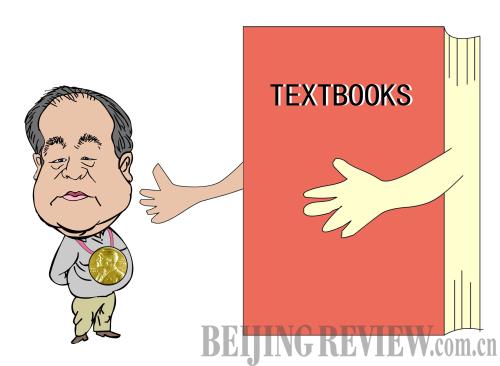|
 |
|
(LI SHIGONG) |
Since Mo Yan became the first Chinese writer to win the Nobel Prize for Literature, debates on whether his masterpieces should be included in primary and middle school textbooks have been widespread. While Language and Culture Press has already included Mo's works into optional Chinese literature reading materials for high school students, People's Literature magazine's editor in chief praises Mo's early short novels as being full of poetry and very suitable for students.
However, is it possible for his work to be used as compulsory education material? A survey conducted by Sina.com.cn shows that 89.7 percent of readers believe Mo's writing to be unfavorable for school.
Supporters
Gen Yinping (www.yznews.com.cn): Even if Mo's writing is not used in middle school textbooks, many students have already begun to read his work. In the Internet era, scholars are spoilt for choice and can easily catch up with the latest trends.
So why is his work not in schools yet? It might be due to the monopoly within China's current textbook editing system. Publishers are seldom worried about whether students are interested in textbook stories or not. When Mo became a Nobel laureate, however, editorial boards suddenly found they might have overlooked an important writer in modern Chinese literature.
Including his work in textbooks is nothing short of an improvement in current middle school education. Currently The Red Radish, which features a poetic, childlike atmosphere, could grab students' attention.
Wang Junrong (www.newssc.org): I'm really surprised by the debates on whether Mo's work should form part of optional courses at middle schools. In my opinion, it's natural to absorb his writing into Chinese textbooks. Mo has reached great achievements in literature and is China's first Nobel Prize laureate. The work of someone eligible for this type of award can't be too bad. It would be helpful for students to read his books during class. Some argue that Mo's work might be unsuitable for students, but the title chosen as optional reading material appears perfectly fine to me. Why is there still so much controversy?
As a matter of fact, Mo's works should have been chosen as textbook materials much earlier. At vocational schools, his writing has long been part of the education system. Mo's works boast beautiful language and interesting stories, which are very popular with students. His work could play an integral part in encouraging kids to read more.
Opponents
Zhang Xiliu (Xi'an Daily): Since Mo received the Nobel Prize for Literature, public enthusiasm for his work has grown. Some publishers want to take advantage of Mo Yan to make big profits and have decided to include his writing into reading materials of middle school optional courses. To some extent, they are taking advantage of the Nobel laureate.
I do not deny the rationality of printing Mo's work in middle school textbooks. His early short novels are full of poetry and interest, thus quite suitable for students to read. Why wasn't his work used in school education before he won the Nobel Prize however? His past achievements seem of little value compared to the current scramble for his books.
In my opinion, publishers have revealed a certain laziness and lack of responsibility when it comes to preparing educational material.
| 